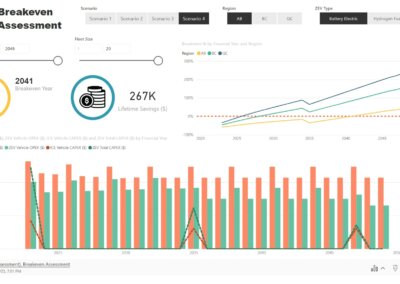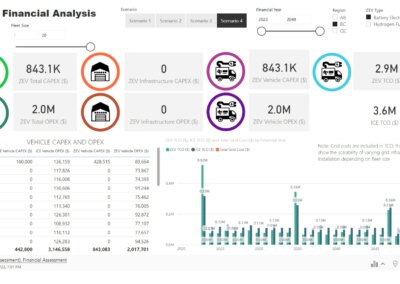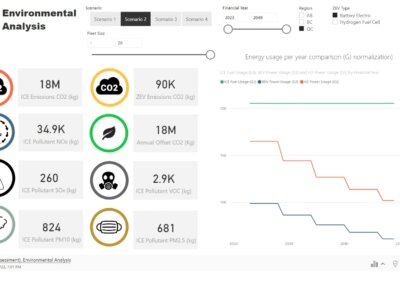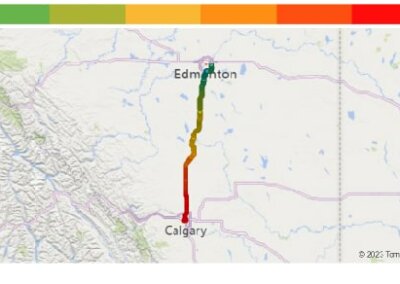About the Project
Transport Canada (TC) is responsible for delivering decarbonization policy frameworks and incentives that positively impact fleets operating in this country. The financial risk and magnitude of transitioning a fleet is one of the frequently asked questions and one of the biggest roadblocks of decarbonization. It is a known fact that ZEVs (Zero Emission Vehicles) can typically be more expensive to purchase than conventional vehicles and require specialized infrastructure. At the same time, the operational expense of ZEVs can be lower than ICE (Internal Combustion Engine) vehicles leading to cheaper cost of electricity (compared to diesel or gasoline) and lower maintenance requirements due to fewer moving parts.
To capture these opposing factors, TC wanted to assess the business case of transitioning various fleets (4 types) from ICE to ZEVs; specifically, looking for the break-even point wherein lower OPEX (Operational Expenditures) of ZEV overtakes the higher up-front CAPEX (Capital Expenditures) of these new vehicles. Because TC is a federal body, it wanted to do this analysis for specific regions of Canada including British Columbia, the Prairies, and Central Canada (ON and QC). Each region has unique challenges in terms of terrain, weather, electricity pricing regimes, subsidies, and existing infrastructure. This study’s purpose was to uncover these challenges through development of a ‘hypothetical’ fleet, capturing the general requirements and nuances of real-life fleets. The hypothetical fleet would then be processed via GHD’s ZEVO (Zero Emissions Vehicle Optimization) tool to provide the techno-economic reality of transitioning these vehicles from a financial, environmental, energy and infrastructure perspective. The goal was to understand the economies of scale, and through that identify the appropriate procurement model and optimal fleet sizes.
Approach
The key objective was to process the various data points identified for the hypothetical fleets and build baseline requirements for a ZEV fleet. Together with Transport Canada, GHD collaboratively created 4 fleet transition scenarios to determine the optimal transition case depending on vehicle types and if applicable, charging protocols. A breakeven assessment was done to provide quantitative insight into the various fleet cases, providing the data driven evidence needed to further market ZEV fleets as a viable solution to MD (medium-duty) and HD (heavy-duty) fleet operators. The scenario analyses will enable fleet operators to decide on the optimal transition pathway that works for their fleet of vehicles from a financial, environmental, energy, infrastructure, operations, and utility perspective. To provide a decarbonization strategy and roadmap, GHD reviewed infrastructure and operational policies to look for improvements and to estimate budgets for changes and operation & maintenance. A rebate strategy was also developed, including cost analysis & comparison, incentive & rebate plan upgrades, and an implementation schedule.
Results
Battery electric vehicles (BEVs) prove to be more financially viable than Hydrogen fuel cell vehicles primarily due to the higher cost of hydrogen fuel, especially in BC and QC. The only exception to this is AB, where hydrogen fuel is cheaper than electricity, due to AB’s ability to produce ‘grey’ hydrogen effectively using natural gas as the medium. Through these findings, TC can better understand the challenges in transitioning fleets across Canada during their decarbonization journey.
Service(s) Provided
− Data validation and situational assessment
− Scenario development (four high-level decarbonization scenarios for the four fleets, utilizing three unique regions in Canada to explore cash flow scenarios)
− Infrastructure policy and operational improvements (Estimate budgets for changes and operation & maintenance)
− Rebate strategy (Cost analysis and comparison, Incentive & rebate plan upgrades, Implementation schedule)
Go back to projects in
View other projects from
Stay in touch with us
Subscribe to our mailing list!
Organization
Connect






